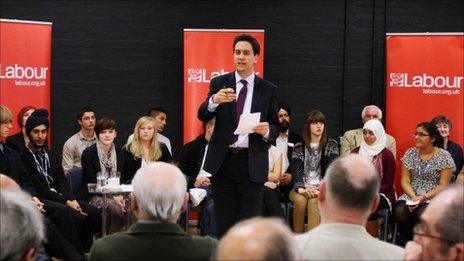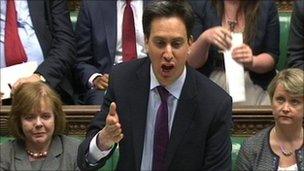Experts review Labour's first year in opposition
- Published
- comments

There has been blanket coverage of the coalition's first anniversary, but how has Ed Miliband's Labour Party performed in its first year in opposition? Five experts give their verdict.
LEADERSHIP
Ed Miliband beat brother David to the Labour leadership in September 2010 by the narrowest of margins.
BBC Radio 5 Live's chief political correspondent John Pienaar says:
"Ed Miliband's always, and rightly, careful to say Labour's taken only the first small steps on its return journey to power. He could fairly say the same of his own mission to become prime minister-in-waiting.
"Yes, he's acknowledged on all sides to be an intelligent and thoughtful politician, qualities which don't always coincide.
"Miliband also appears comfortable in the company of 'ordinary' people; more than could be said, frankly, of his former boss and mentor, Gordon Brown (a relationship David Cameron will never allow him, or us, to forget).
"He's often at his best in his weekly Commons jousts with Cameron at Question Time. Taking on and defeating brother David for the leadership showed a streak of ruthlessness.
"But he has yet to 'punch through', in the jargon, in his efforts to give new definition to Labour, or himself.
"His claim to be the champion of the 'squeezed middle' may have potential. So far, it's more often been derided as being so vague as to be meaningless.

Ed Miliband is often at his best in the House of Commons
"And owning up to Labour's past errors in handling such issues as immigration, financial regulation and the balance between services and manufacturing has simply amplified the demand for Miliband to set out what Labour thinks - and would do now - given the opportunity. The row over spending cuts has stuttered on like a stuck record for months. Miliband condemns cuts. Coalition ministers demand to know what he would cut instead.
"Polls show Ed Miliband lags behind Mr Cameron on many qualities of leadership. And Labour's current lead over the Conservatives is measured in small single figures.
"All this may change, when the effect of spending cuts kicks in, and public opinion polarises. Miliband still has time. The coming year will be important in defining the Labour leader, and just as importantly, perceptions of his ability to run a country."
POLICY
In November, Labour launched a two-year policy review to move the party beyond New Labour and reconnect with voters.
Nick Pearce, director of centre-left think tank the Institute of Public Policy Research, says:
"All parties wipe the slate clean on their policy commitments after general election defeats. It is part of the process of coming to terms with losing and reconnecting with the electorate.
"This time, however, Labour has a bigger task than it has faced for a generation.
"In most of Europe, social democratic parties are in retreat, shedding votes and losing power. The aftermath of the Great Recession has not re-energised the left, as many hoped and expected. Instead, it has emboldened right-wing forces.
"Labour shares in this wider malaise, confronting the difficult electoral reality of a fractured voting coalition and the splintering of allegiances to the two main parties.
"It has also to reckon with its own record in power: how much does it defend, criticise or move beyond?

Labour wants to reconnect with the concerns of ordinary families
"Neither a shift to the left nor a 'one-more-New-Labour heave' look like plausible electoral strategies. But if that is so, what is the core political direction Labour wants to follow?
"What is the strategy that can compare with Tony Blair's New Labour shift to the centre-ground?
"And what does this mean for the big component parts of the political identity of the Labour Party?
"Will it be more interventionist on the economy, more liberal on the state and more conservative on community life?
"Ed Miliband's single biggest task is to restore the party's economic credibility. It has lost the argument with the public on the deficit.
"Can it win the argument on growth, living standards and Britain's economic future?"
PRESENTATION
In December, Ed Miliband appointed former Times journalist Tom Baldwin as his communications chief, assisted by former Daily Mirror man Bob Roberts.
Lance Price, author and former Labour Party director of communications, says:
"Ed Miliband now has an experienced and effective team of media experts who have helped sharpen up his performance and improve his image.
"In the first year after an election the voters rarely want to hear much from the losing party.
"It is very hard to put across a positive message and so Miliband has been forced to spend most of his time reacting to the Tory-led coalition government's policies and statements.
"As a result people know what Ed Miliband is against but have very little idea what he's for.
"Although the next election seems a long way off, Labour can't afford to be simply reactive any longer.
"Miliband has to explain what a Labour government under his 'new generation' leadership would be like, what it would do differently, what it would offer the country that the coalition doesn't.
"Simply promising to cut less severely and less quickly isn't enough.
"Very soon Miliband and his team must start making news and not just appearing for a ritual comment in stories about the other parties.
"Labour's policy review is a long process. He can't wait until it's over. The time to start making an impression in his own right is now."
Lance Price's latest book, Where Power Lies, is out in paperback
ELECTIONS
Thursday, 5 May was the first big electoral test of Ed Miliband's leadership.
BBC Polling Expert David Cowling says:
"The results of the May 2011 elections presented a mixed bag for Labour.
"In Scotland, the SNP stormed to outright victory but largely off the back of taking votes from other parties rather than from Labour. But this was small consolation as Labour seat after Labour seat fell in its traditional heartlands.
"In Wales, they ended just short of outright victory but still managed a 10-point increase in their vote share compared with 2007 when the last Assembly elections were fought.
"In the English local council elections, the picture was more complicated. Labour ripped the heart out of the Lib Dem vote in many of the great cities but the reason their net gain of 839 seats fell short of an anticipated 1,000 was the remarkable resilience of the Conservative vote.
"The collapse of the Lib Dems delivered up gains to both Labour and the Conservatives. And in the end, Labour's performance weakened the further south it went."
OPPOSITION
A key part of being the official opposition is holding the government to account.
Nigel Fletcher, director of the Centre for Opposition Studies, says:
"Adapting to being in opposition is always a tough challenge, mixed with a fair bit of personal trauma.
"Former ministers, who have grown accustomed to the world of chauffeured cars, red boxes and thousands of civil servants serving them, suddenly find themselves on their own, with no support and few people to care what they have to say.
"Like many before them, Labour MPs were able to divert themselves with the activity and excitement of a leadership contest, giving them the illusion of meaningful activity.
"But this only postponed for a few months the day when the reality of being out of power dawned.
"New Leaders usually have something of a honeymoon, but the uniquely personal circumstances of Ed Miliband's victory over his brother mean he has struggled to assert his authority and convey a sense of direction.
"Whilst many frontbenchers have taken to the job of attacking the government with gusto, the recent election results have perhaps shown that a positive alternative has yet to emerge."